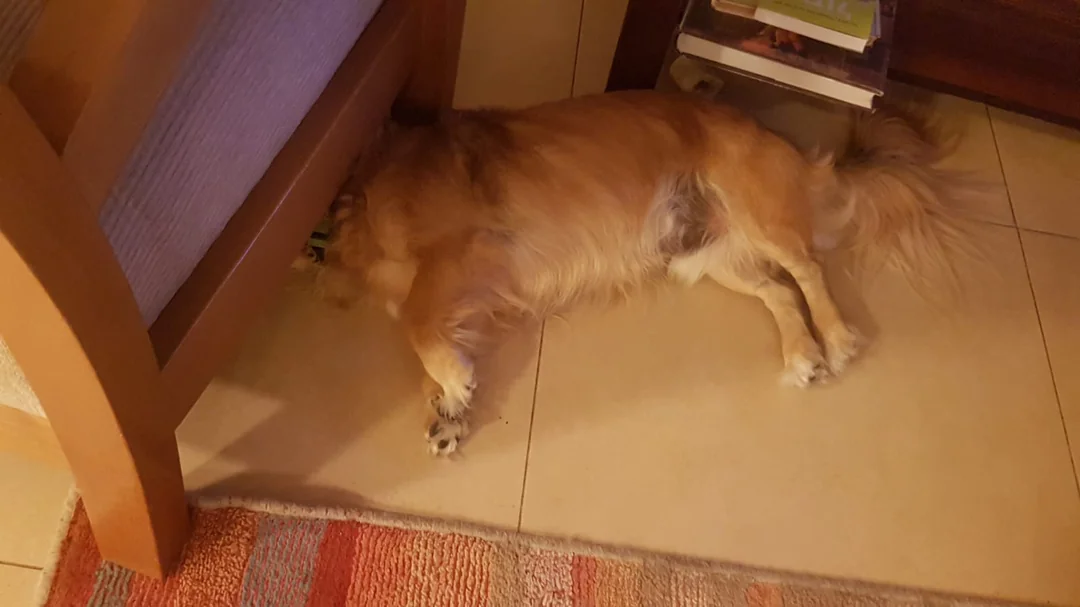As pet owners, we often find ourselves puzzled by the peculiar sleeping habits of our furry friends. One common behavior that can leave us scratching our heads is when our dogs choose to sleep on the floor instead of their cozy beds or plush cushions. While it may seem strange to us, there are several reasons of Why Does My Dog Sleep on the Floor, hard surface of the floor for their slumber.
Firstly, dogs have a natural instinct to seek out cool spots to rest. Unlike humans, who can regulate their body temperature more effectively, dogs rely on external factors to cool down. Floors are typically cooler than elevated surfaces like beds or furniture, making them an appealing choice for a dog seeking relief from the heat.
 Exploring the Reasons Behind Why Does My Dog Sleep on the Floor
Exploring the Reasons Behind Why Does My Dog Sleep on the Floor
While it may seem puzzling to us, there are several key factors that can contribute to why your dog chooses to sleep on the floor instead of their designated sleeping area. Understanding these reasons can help us create a comfortable environment for our furry companions.
1. Seeking Comfort and Security
Dogs have a natural instinct to seek out a secure and comfortable place to rest. Sleeping on the floor allows them to feel grounded and in control of their surroundings. This behavior is rooted in their ancestry as den animals. The floor mimics the feeling of sleeping in a den or a safe, enclosed space, providing them with a sense of security that can lead to a more restful sleep.
2. Regulating Body Temperature
Dogs have a limited ability to regulate their body temperature, especially compared to humans. They rely on external factors to cool down, and the floor often provides a cooler surface than elevated areas like beds or furniture. This is particularly true for breeds with thick coats or brachycephalic breeds (like Bulldogs or Pugs) that are more prone to overheating. By choosing the floor, dogs can effectively regulate their body temperature and find relief from the heat.
3. Breed and Size Considerations
It’s important to consider your dog’s breed and size when trying to understand their sleeping preferences. Some breeds naturally prefer cooler surfaces, while others may have physical limitations that make sleeping on the floor more comfortable. Larger dogs, for example, may find it challenging to fit comfortably on a bed or in a designated sleeping area, and the floor provides them with ample space to stretch out and relax.
4. Personal Preferences and Habits
Just like humans, dogs have their own unique preferences and habits when it comes to sleeping. Some dogs may simply find the floor more comfortable or enjoy the freedom of movement it provides. Others may have developed a habit of sleeping on the floor over time, and it has become their preferred sleeping spot. Understanding your dog’s individual needs and preferences can help you create a sleeping environment that caters to their specific requirements.
Practical Recommendations for Why Does My Dog Sleep on the Floor
Here are some of the recommendations for Why Does My Dog Sleep on the Floor:
1. Provide Cooling Options
If your dog tends to seek out the floor for its coolness, consider providing additional cooling options in their sleeping area. Invest in a cooling mat or bed specifically designed to regulate body temperature. These products are often made with materials that stay cool without the need for refrigeration. Alternatively, you can place a fan near their bed to circulate air and create a cooler environment.
2. Create a Cozy Den-Like Space
While some dogs may prefer the open space of the floor, others still crave the feeling of security that a den-like space provides. Consider providing a comfortable and enclosed sleeping area, such as a crate or a designated corner with soft blankets or a dog bed. This will give your dog the option to choose between the floor and a cozy space, depending on their mood and comfort needs.
3. Choose the Right Bed
When selecting a bed for your dog, take into account their breed, size, and individual preferences. Opt for beds with cooling properties, such as those made with breathable materials or gel-infused foam. Ensure that the bed is large enough to accommodate your dog’s size comfortably. Some dogs may prefer orthopedic beds that provide extra support, while others may enjoy the simplicity of a soft, cushioned bed.
4. Encourage Positive Associations
If your dog has developed a habit of sleeping on the floor, it may require some encouragement to transition to a designated sleeping area. Make the bed or sleeping area more appealing by placing their favorite toys, treats, or familiar scents nearby. Reward your dog with praise and treats when they choose to sleep in their designated spot, gradually reinforcing positive associations with their bed or sleeping area.
5. Observe and Adapt
Every dog is unique, and their sleeping preferences may change over time. Observe your dog’s behavior and adjust their sleeping arrangements accordingly. If you notice that they consistently choose the floor, ensure that it is a safe and comfortable space for them. Regularly assess their bed or sleeping area to ensure it is clean, free of debris, and provides the necessary comfort and support they need.
 By implementing these practical recommendations, you can create an environment that caters to your dog’s sleeping preferences while ensuring their comfort and well-being. Remember to be patient and understanding, as it may take time for your dog to adjust to new sleeping arrangements. Ultimately, the goal is to provide them with a space where they can rest peacefully, whether it be on the floor or in a designated sleeping area.
By implementing these practical recommendations, you can create an environment that caters to your dog’s sleeping preferences while ensuring their comfort and well-being. Remember to be patient and understanding, as it may take time for your dog to adjust to new sleeping arrangements. Ultimately, the goal is to provide them with a space where they can rest peacefully, whether it be on the floor or in a designated sleeping area.
Why Does My Dog Sleep on the Floor – Conclusion
While the reasons behind Why Does My Dog Sleep on the Floor may vary, it’s essential to respect and accommodate their choices. Whether it’s seeking comfort and security, regulating body temperature, breed and size considerations, or personal preferences and habits, each dog has its own unique reasons for their sleeping habits. By understanding and adapting to their needs, we can ensure that our furry friends have a safe and comfortable space to rest, whether it be on the floor or elsewhere.















 Exploring the Reasons Behind
Exploring the Reasons Behind 






